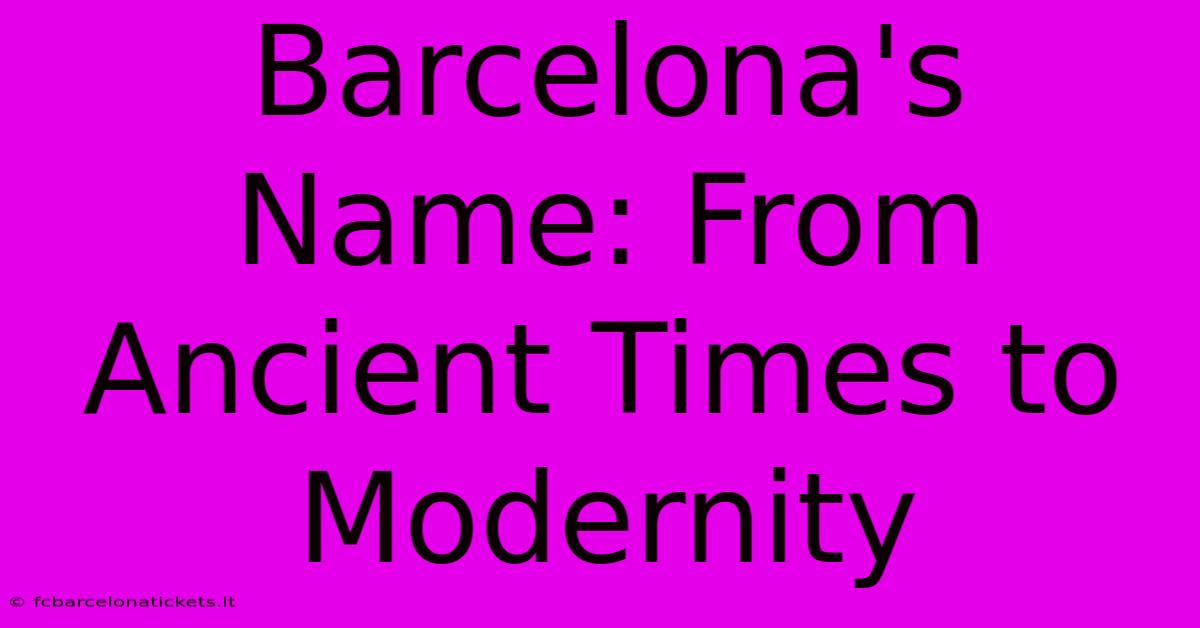Barcelona's Name: From Ancient Times To Modernity

Table of Contents
Barcelona's Name: From Ancient Times to Modernity
Barcelona, a vibrant city on the Mediterranean coast, boasts a history as rich and complex as its architecture. But how did this iconic city get its name? The etymology of "Barcelona" is a fascinating journey through time, weaving together ancient origins and linguistic evolution. Understanding its name unlocks a deeper appreciation for the city's enduring legacy.
The Roots of Barcino: A Roman Legacy
The story begins not with "Barcelona," but with Barcino. Founded in the first century BC by the Romans, the city's original name reflects its Roman heritage. While the precise origin of "Barcino" remains debated among scholars, the most widely accepted theory links it to the Iberian word barc-, meaning "high place" or "peak," potentially referencing the city's strategic location on a hill overlooking the sea. This suggests a pre-Roman settlement that may have influenced the Roman naming convention. Other theories propose connections to a local tribe or even a Roman family name. Regardless of its precise origin, Barcino firmly established the city's identity within the Roman Empire.
From Barcino to Barchinona: A Linguistic Transformation
Over centuries, the name evolved. The addition of the suffix "-ona" is a testament to the city's growth and increasing importance. "-ona" is a suffix common in many Romance languages, often indicating size or abundance. Thus, Barchinona implies a larger, more significant settlement than the original Barcino. This shift reflects the city's gradual development and flourishing under different rulers and cultural influences.
The Arrival of "Barcelona": A Catalan Identity
The transition from Barchinona to Barcelona is more straightforward, largely attributed to phonetic shifts and the natural evolution of the Catalan language. The Catalan language, a Romance language closely related to Occitan and Spanish, gradually became the dominant tongue in the region, shaping the pronunciation and spelling of the city's name. The modern "Barcelona" retains the core elements of its Roman origins while reflecting the Catalan cultural identity that has shaped the city for centuries.
The enduring influence of the name: More than just a label
The name Barcelona itself carries historical weight. It's not just a geographical label; it represents the city's layered history, from its Roman foundations to its medieval flourishing under the Counts of Barcelona, and its modern status as a global metropolis. The city's name is a tangible link to its past, connecting generations and reminding us of the diverse cultural influences that have shaped its identity.
Barcelona Today: A Global Icon
Today, Barcelona is synonymous with Gaudí's architectural marvels, vibrant culture, and Mediterranean charm. Yet, understanding the etymology of its name—from the Roman Barcino to the modern Barcelona—adds another layer to our appreciation of this remarkable city. Its name is a living testament to its resilience and the enduring legacy of its rich and multifaceted history. It’s a story etched not only in stone and architecture, but in the very name itself.
Keywords: Barcelona, Barcino, Barchinona, Catalan, Roman, history, etymology, name origin, Mediterranean, Gaudí, city, Spain, Roman Empire, linguistic evolution, cultural identity.

Thank you for visiting our website wich cover about Barcelona's Name: From Ancient Times To Modernity. We hope the information provided has been useful to you. Feel free to contact us if you have any questions or need further assistance. See you next time and dont miss to bookmark.
Featured Posts
-
Explore Barcelonas Parks September 2024
Mar 29, 2025
-
1998 99 Barcelona The Games That Defined Their Season
Mar 29, 2025
-
Barcelona Style Guide Dress To Impress
Mar 29, 2025
-
Recruitment Reimagined Headhunter Barcelona
Mar 29, 2025
-
Experience Barcelona Like A Local Sofitel Or Kimpton
Mar 29, 2025
